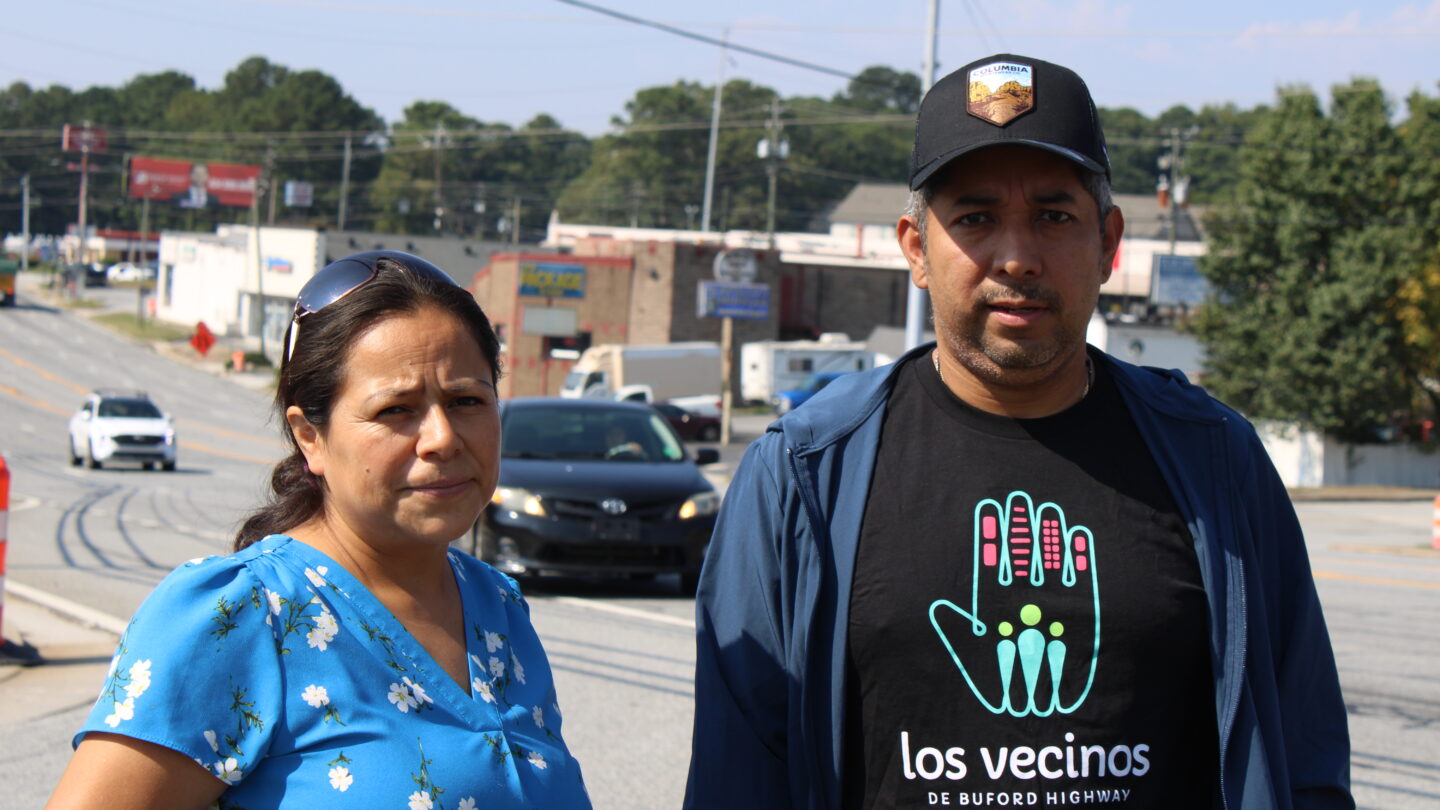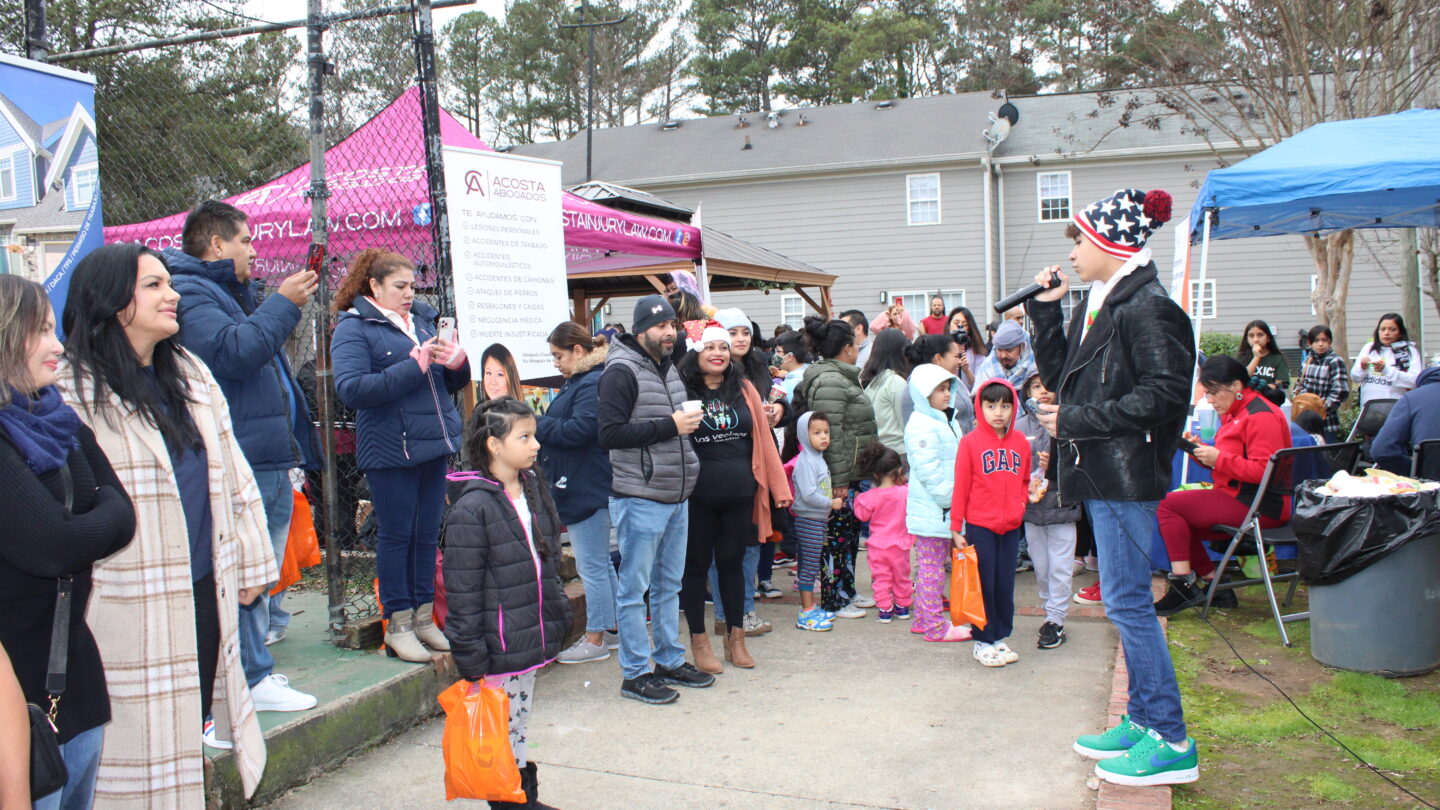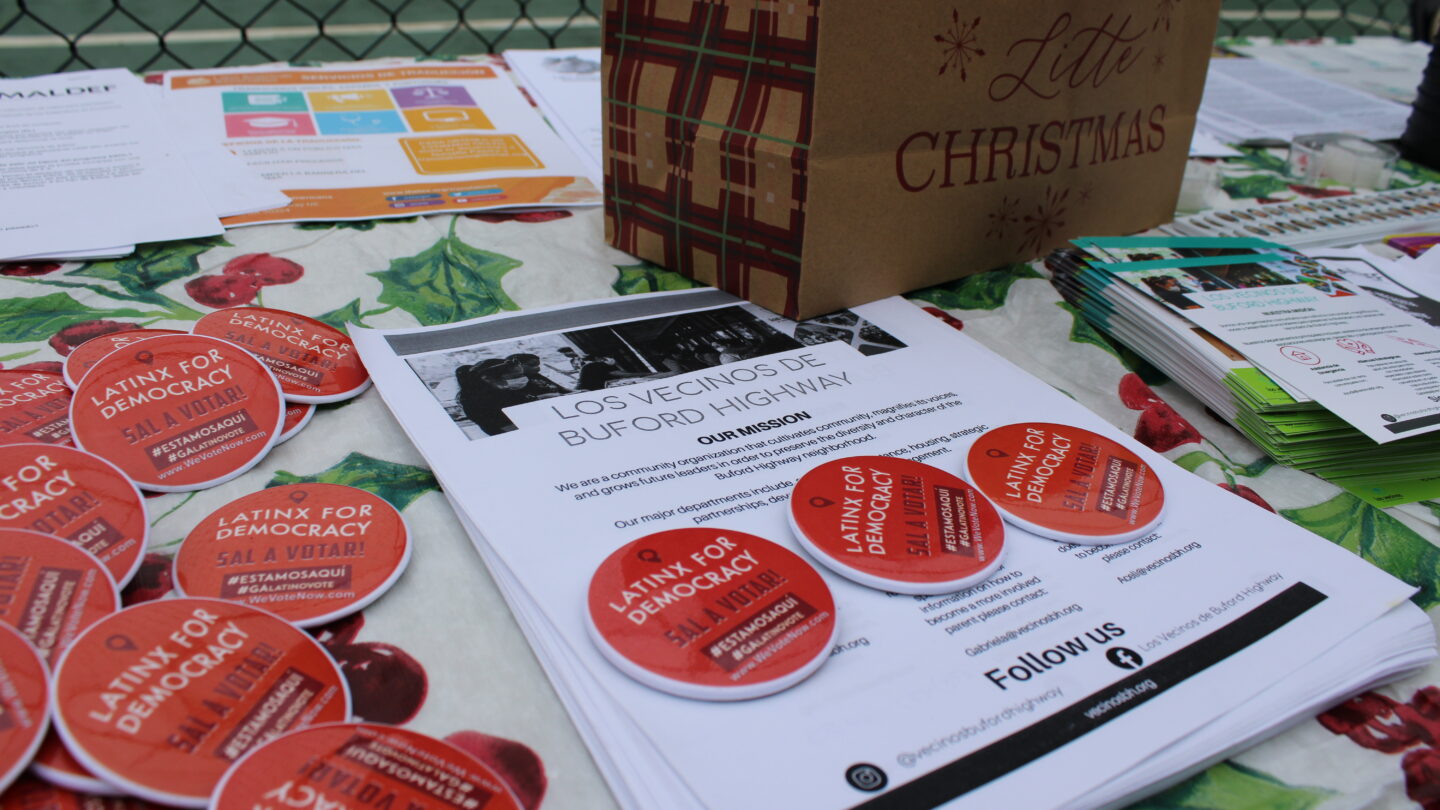A neighborhood group that started in a high school classroom now supports hundreds living along Buford Highway

Aceli Zenil, Director of Housing for Los Vecinos de Buford Highway and Manuel Varcenas, a volunteer with the organization, stand outside of a strip mall on Buford Highway. Sophia Qureshi
Aceli Zenil remembers the day, six years ago, when her air conditioner broke. It was in July. In the dead heat of the Atlanta summer. For two weeks, she tried to keep herself and her three children cool with two fans she had bought at Home Depot. Her neighbors at the Northeast Plaza Apartments on Buford Highway were in the same boat. She had called the property manager, but nothing was fixed. When she asked the manager to pay for a hotel, they refused.
Not knowing where to turn, Zenil reached out to a friend, who connected her with Rebekah Cohen Morris, a local teacher whom she had heard had supported some of the residents in the area. The next step—advised Morris—was to put her complaint in writing because “that puts them on notice.” If that didn’t work, they would call the Brookhaven Code Enforcement Office.
The air conditioner was fixed by the next day.
Zenil had lived in that apartment complex for 12 years and had never realized how a piece of paper could make a difference so fast. With the letter, she said, “they could see that I know what to do.”
Zenil went on to become the housing director for Los Vecinos de Buford Highway (“The Neighbors of Buford Highway”)—an association of Latinx community leaders who live in the housing developments along Buford Highway reaching all the way from Chamblee to Norcross. In just six years since its inception, Vecinos has managed to connect hundreds of residents in the area and serve as a conduit for other nonprofits and government agencies to reach communities that have been harder to connect with through traditional channels - much of the metro area’s undocumented, Spanish-speaking communities.
Since the beginning, housing has been their primary issue. “When you sign a legal document in this country, it’s supposed to be illegal to sign something that you don’t understand…that happens every single day to our families. We see them get bamboozled because they don’t know what they’re signing, because they don’t know what’s going on,” said executive director Stephanie Correas.
Through neighborhood networking, programming, and now, legal support, Vecinos works to fill that gap.
Through neighborhood networking, programming, and now, legal support, Vecinos works to fill that gap.

Residents, volunteers, and organizers with Los Vecinos gather to hear local musician Henry Torres sing at the Los Vecinos de Buford Highway Christmas party at Huntington Station Apartments in December 17, 2022. Sophia Qureshi
The seeds of Vecinos were planted in 2015, in a classroom in Cross Keys High School, about a half a mile from Buford Highway. Morris, a young teacher who had grown up in Pennsylvania, was struggling to connect with her ninth-grade students, the majority of whom were low-income and Hispanic. “I noticed they didn’t care about my assignments,” she said. So she decided to switch gears and focus on something they were more likely to care about: their neighborhoods. An estimated 340,000 people are undocumented in Georgia, hailing primarily from Mexico, Guatemala, Honduras, and El Salvador, according to a 2019 analysis by the Migration Policy Institute. But because of fear around filling out official census surveys, the actual number could be significantly higher. Many of the region’s mixed status and undocumented families are clustered along the Buford Highway corridor – an area that became a hub for those migrating from Latin America during the construction boom spurred by the 1996 Olympics in Atlanta. In Doraville alone, a city that Buford Highway runs through, more than half the population is Hispanic, and Latin Americans living there can’t fully participate in society—they can’t vote, run for office, or get a driver’s license. At the other end of the corridor, in Norcross, almost half of the population is Hispanic.
There are practical challenges for many people living in the area, like the risks of driving without a license or restrictions around applying for jobs. Marco Palma, one of the co-founders of Los Vecinos and a graduate of Cross Keys High School, said he also remembers a general feeling of disconnection. “While I was growing up, there were a lot of people that felt disenfranchised. I think now I look back, and I have the vocabulary to describe what it was…[people] felt…left out of the political process, left out of general community events, left out of the school system.”
Morris tapped into that feeling in her classroom. When she asked her students to think about what they loved about their neighborhoods, they focused on what they didn’t love. “A lot of them are like, I hate this neighborhood. Crappy school. It’s overcrowded. We almost get hit by cars too. There’s no sidewalk. Managers aren’t fixing anything in our apartments, and we have immigration coming in taking our parents and deporting them.”
“I could see why they didn’t really care about Romeo and Juliet,” she said.
The students channeled their frustrations into a class assignment- the Buford Highway Project – which they exhibited at Plaza Fiesta—a 350,000 square foot shopping plaza that serves as a cultural and commercial center for area’s Latinx communities. Wearing navy blue t-shirts with “The BUHI Project” written across them, the students presented their findings to local residents and community leaders on posters boards. They articulated problems in their neighborhoods and potential solutions—everything from ways to improve housing to the need for more sidewalks.
When it was all over, it didn’t feel over. “They were like, are we just going to stop? I [was] like, we can keep going,” said Morris. Some of the students decided to participate in a Brookhaven City Council meeting. “They were the only people that looked like them representing their community in that room. No one there was from those apartments on Buford Highway. But they made up the majority of the residents at Brookhaven.”
After that city council meeting, a couple of streetlights were fixed, said Morris. Some kept going – including Palma, DeAnna Parker, and Katherine Navarez—and encouraged more residents to get involved by attending regular community dinners in the apartment complexes.
“Whenever we would have events, I could see it in people’s faces, like finally, we feel included. Finally, someone knocked on my door,”
“Whenever we would have events, I could see it in people’s faces, like finally, we feel included. Finally, someone knocked on my door,” said Palma.
Today, hundreds of residents living along Buford Highway are connected through multiple Whatsapp groups that have been set up through Vecinos, including one just for the Parktown North apartment complex in Brookhaven, one for Chamblee Heights apartments, one for all things education related, one for jobs, and one that includes information about free food distributions.
“We’re each other’s ears and eyes,” said Correas, Vecinos’ executive director. “If there’s a fire going on, we know right away, because somebody in our Whatsapp group lets us know…if there’s an elderly couple that can’t make it out of their apartment for some reason, and needs care, someone will put it in our groups…that’s how we’re able to mobilize.”

Flyers and informational materials at one of the tables at the Los Vecinos Christmas party at Huntington Station Apartments in December 17, 2022. Sophia Qureshi
Members of Vecinos – including both volunteers and staff – work to support the organization while also juggling their day jobs. Zenil would respond to messages on everything from how to apply for rental assistance to how to file a housing complaint, in between cleaning houses during the day. Coreas runs a consulting firm to support small business owners.
In 2022, following major sewage eruptions at an apartment complex in Brookhaven that impacted multiple families, Vecinos contracted with a legal team that consisted of two lawyers and two paralegals to help support the families.
The organization’s heartbeat, though, continues to be its volunteers. Anywhere from 40 to 60 volunteers who help out with everything from setting up food drives to distributing informational flyers at community dinners. Manuel Varcenas is one of them. By day, he works at a restaurant in Little Five Points, but in the evenings he’s back home on Buford Highway, where he’s lived for around 20 years.
Varcenas has seen the power of Vecinos firsthand.“When you say Los Vecinos to the apartment complex [managers]…they try to do something better. Before, they were just ignoring you.”
Zenil agrees. “Sometimes we felt alone. Like we don’t know where we can go and what we can do.” But with Vecinos, she said, “Everything changed … If someone calls me with a problem now, I know exactly what to tell them to do.”
Update: As of February 2023, Aceli Zenil no longer worked as housing director at Los Vecinos. She is now a co-founder of Los Amigos de la Comunidad – Georgia, a community empowerment organization.


